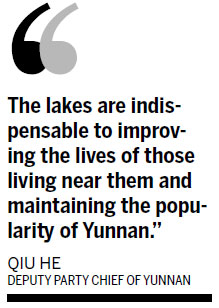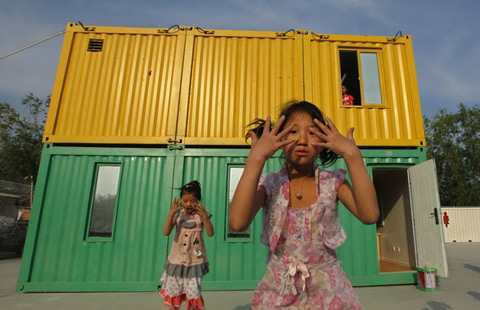Yunnan set to allocate $4 billion to clean lakes
Updated: 2014-04-03 07:57
By Hu Yongqi (China Daily)
|
|||||||||||
Water diversion, anti-pollution ditches planned to upgrade quality
Yunnan province will spend 24.6 billion yuan ($4 billion) to upgrade the water quality of nine lakes and their ecological systems this year, with more than half that sum, 12.6 billion yuan, earmarked for cleaning the famous Dianchi Lake in the provincial capital, top officials have said.
Li Jiang, executive vice-governor of Yunnan, said the province will try to restore lakes in the plateau province, and this will include measures such as water diversion and anti-pollution ditches for waste discharge.
"Yunnan has a major advantage in its ecology and living environment. The lakes are indispensable to improving the lives of those living near them and maintaining the popularity of Yunnan for visitors from all over the country," said Qiu He, deputy Party chief of Yunnan.

Maintaining Dianchi Lake, the biggest of Yunnan's nine freshwater lakes, has been a challenge for the Kunming government for decades, according to local authorities.
Dianchi Lake, the sixth-largest freshwater lake in China with an area of 330 sq km, has been troubled by deteriorating water quality over the past 20 years after being polluted by industrial emissions and human waste along its drainage area.
Wang Daoxing, deputy mayor of Kunming, said the city will continue construction of 46 projects and complete 38 of them by the end of the year with a total investment of 12.6 billion yuan.
This year, the Kunming government has set a target to ensure its water quality is better than it was in 2013.
Erhai Lake in the Dali Bai autonomous prefecture, second to Dianchi Lake in Yunnan in terms of area, was found to contain cyanobacteria, or blue-green algae toxins, in September and October.
He Hua, head of Dali, said the prefecture government has budgeted 700 million yuan for projects to control waste discharged by people living around the lake and increase the clean mountain water from nearby.
Development, especially the opening of more hostels and a rise in agricultural waste, contributed to the toxins, He said.
To combat this, a ditch will be dug around the lake to intercept waste and let it flow to a sewage treatment plant, He said. About 3.5 km of the ditch will be built by the end of this year.
Water coming from nearby Cangshan Mountain contributes 30 percent of inflow to Erhai Lake, but two-thirds of the 230 million cubic meters of water was consumed by residents or hotels last year.
Therefore, He said, a tap water network is being built to provide the villages at the foot of the mountain with water so cleaner and low-temperature water, which helps kill algal toxins, can be diverted into Erhai Lake.
The lakes in Yunnan attract millions of visitors and greater steps will be taken to ensure stricter controls on waste from restaurants and hotels.
"Anti-pollution efforts need support in funds and personnel from the central and provincial governments, and it takes time and patience," He said.
Li Yingqing and Guo Anfei contributed to this story.
huyongqi@chinadaily.com.cn
Related Stories
Yunnan welcomes creativities of "Yunnan element" 2014-03-27 17:32
Yunnan vice governor sacked for disciplinary violations 2014-03-12 12:24
Water quality info available online 2013-12-30 10:09
Water quality a concern 2013-02-25 07:57
A bite of Luoping County in Yunnan 2014-03-10 16:19
Today's Top News
Turkey expects China's high speed rail investment
Search for MH370 'must not ease up'
China announces economic package
2 more human H7N9 cases in China
Full text of China's policy paper on EU
Xi's trip builds bridge to Europe
China Daily wins award in UK
NATO halts co-op with Russia
Hot Topics
Lunar probe , China growth forecasts, Emission rules get tougher, China seen through 'colored lens', International board,
Editor's Picks

|

|

|

|

|

|





